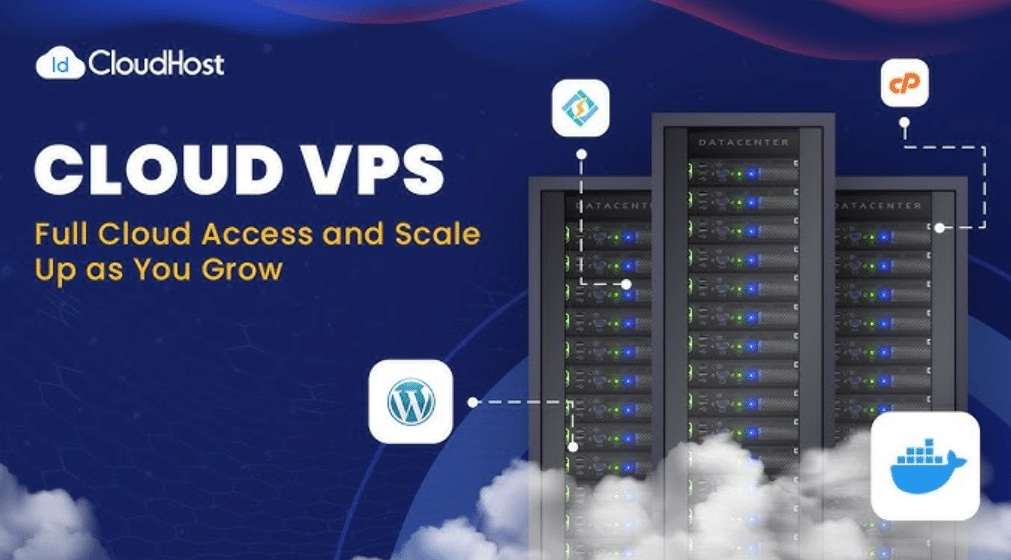VPS Cloud Server – In the dynamic and ever-evolving digital world, businesses, developers, and tech enthusiasts are in constant search of efficient and affordable hosting solutions. The ideal platform should offer reliability, high performance, scalability, and control—without the high costs of dedicated infrastructure. Enter the VPS Cloud Server, a hybrid hosting solution that merges the power of virtualization with the vast potential of cloud computing.
Whether you’re launching a website, developing software, running applications, or hosting game servers, a Virtual Private Server (VPS) in the cloud offers a compelling blend of independence, performance, and affordability. This article will explore what a VPS Cloud Server is, how it works, its benefits, top providers, use cases, and how to choose the best VPS cloud solution for your needs.

What is a VPS Cloud Server?
A VPS Cloud Server is a virtual machine hosted on a cloud infrastructure. It combines two key concepts:
-
VPS (Virtual Private Server): A virtualized environment running its own operating system, allocated specific resources (CPU, RAM, disk) from a physical server.
-
Cloud Computing: A network of interconnected servers that provide scalable, on-demand computing resources over the internet.
In a cloud VPS setup, multiple virtual servers are created on a shared physical infrastructure within a cloud environment, providing higher reliability and scalability than traditional VPS hosting.
Key Characteristics of Cloud VPS Hosting
-
Isolation: Each VPS operates independently with its own OS and resources.
-
Scalability: Easily upgrade or downgrade resources like CPU, RAM, and storage.
-
High Availability: Cloud-based VPS servers are hosted on redundant systems, reducing the risk of downtime.
-
Root Access: Users have full administrative access, allowing them to install software, configure settings, and manage security.
How Does a Cloud VPS Server Work?
Cloud VPS hosting uses hypervisor software (such as KVM, Hyper-V, or VMware) to virtualize the physical server. Each VPS functions like a standalone server, but it’s actually a slice of a more powerful machine.
In the cloud context, VPS instances are distributed across multiple data centers. This enables:
-
Load balancing
-
Failover support
-
Geographical redundancy
-
Auto-scaling
Users manage their VPS via control panels (e.g., cPanel, Plesk, or proprietary dashboards) or command-line interfaces, giving them full control over their digital environment.
Advantages of Using a VPS Cloud Server
1. Cost-Effectiveness
Cloud VPS offers near-dedicated server performance at a fraction of the price. You pay only for the resources you use, with options to scale on-demand.
2. Performance
With dedicated RAM, CPU cores, and SSD storage, cloud VPS hosting ensures consistent and fast performance for websites and applications.
3. Scalability
One of the biggest advantages is the ability to scale resources instantly based on traffic spikes or business growth—without downtime.
4. Security
Cloud providers implement advanced security measures including firewalls, DDoS protection, and encrypted storage. You also manage your own firewall rules and user access.
5. Customization
Install any OS (Linux, Windows), control server configurations, run specialized software, and tailor your VPS to your exact requirements.
6. Global Accessibility
You can deploy cloud VPS servers in multiple geographic regions, improving latency and data sovereignty.
Common Use Cases for VPS Cloud Servers
-
Website Hosting: Ideal for eCommerce stores, WordPress sites, and content-heavy portals.
-
Software Development: Dev environments with version control, databases, and staging areas.
-
Game Servers: Host Minecraft, Rust, ARK, or other multiplayer games with mod support.
-
Web Applications: Run APIs, CRMs, ERPs, or SaaS platforms.
-
Database Hosting: Secure, high-performance environments for MySQL, PostgreSQL, MongoDB, etc.
-
VPN & Proxy Servers: Deploy secure, private internet access nodes.
-
Reseller Hosting: Subdivide your VPS and sell hosting services.
VPS vs Shared Hosting vs Dedicated Server vs Cloud VPS
| Feature | Shared Hosting | VPS Hosting | Dedicated Server | Cloud VPS Server |
|---|---|---|---|---|
| Resource Isolation | No | Yes | Yes | Yes |
| Scalability | Limited | Manual upgrade | Manual upgrade | Instant, automatic |
| Performance | Low-Medium | Medium-High | High | High |
| Cost | Low | Medium | High | Medium |
| Customization | Limited | High | Full | Full |
| Uptime/Reliability | Medium | Medium | High | Very High |
Top VPS Cloud Server Providers in 2025
1. DigitalOcean
-
Simple UI, developer-friendly
-
Droplets with scalable resources
-
Features include backups, firewalls, monitoring
-
Pricing starts at $4/month
2. Linode (now part of Akamai)
-
High-performance cloud VPS with SSD storage
-
Full root access, DDoS protection
-
Hourly and monthly billing
-
Plans from $5/month
3. Vultr
-
Global data centers and one-click apps
-
Bare metal and cloud VPS options
-
Custom ISO support
-
Pricing from $2.50/month
4. Kamatera
-
Enterprise-grade infrastructure
-
13+ global data centers
-
30-day free trial with custom configurations
-
Great for scalable business apps
5. OVHcloud
-
European leader in cloud VPS
-
Competitive pricing with strong privacy policies
-
Great for EU-based users
6. Hostinger VPS
-
Affordable VPS hosting with VPS control panel
-
Ideal for WordPress and small business websites
-
Starts at around $5/month
7. AWS Lightsail
-
Simplified VPS offering from Amazon
-
Predictable pricing, built on AWS infrastructure
-
Perfect for developers and small applications
How to Choose the Best VPS Cloud Server for Your Needs
1. Define Your Use Case
Are you hosting a blog, running a SaaS app, or managing game servers? Your use case determines CPU, RAM, and bandwidth needs.
2. Check Data Center Locations
Choose a provider with servers near your audience to reduce latency.
3. Evaluate Uptime Guarantees
Look for providers offering at least 99.9% uptime SLA.
4. Security & Backups
Ensure your provider offers encrypted data transfer, regular backups, and firewall options.
5. Scalability
Can you scale vertically (more CPU/RAM) and horizontally (more servers) without downtime?
6. Customer Support
Look for 24/7 support through chat, tickets, or phone. Test response times.
7. Pricing
Compare hourly vs monthly pricing. Some providers offer discounts for longer commitments.
How to Set Up a VPS Cloud Server (Quick Steps)
-
Choose a Provider (e.g., DigitalOcean, Vultr)
-
Select VPS Plan based on RAM, CPU, and storage needs
-
Choose OS (Ubuntu, CentOS, Debian, Windows)
-
Configure Add-ons (backups, firewalls, monitoring)
-
Deploy VPS and get login credentials
-
Access VPS via SSH
-
Install Software (LAMP stack, NGINX, Docker, etc.)
-
Secure Your Server (change SSH port, set up firewall, enable fail2ban)
-
Automate Backups and monitor resource usage
VPS Cloud Server Security Best Practices
-
Use SSH keys instead of passwords
-
Regularly update system packages and kernel
-
Install a firewall (like UFW or iptables)
-
Monitor login attempts with intrusion detection tools
-
Encrypt all data in transit (SSL/TLS)
-
Schedule automatic backups
-
Use two-factor authentication (2FA) for your control panel
The Future of VPS in the Cloud
As cloud technologies evolve, so does the potential of VPS hosting. Key trends shaping the future include:
-
Edge Computing: VPS nodes closer to users for lower latency
-
AI-powered Monitoring: Predictive analytics to optimize performance and prevent failure
-
Container Integration: Combining VPS and Docker/Kubernetes for agile deployment
-
Green Cloud Initiatives: Energy-efficient data centers for sustainable hosting
Conclusion
The VPS Cloud Server stands out as one of the most powerful and flexible hosting solutions in today’s cloud ecosystem. It offers the perfect middle ground between affordability and performance—without sacrificing control or security. Whether you’re a solo developer, a small business, or a growing enterprise, cloud VPS can scale with your ambition and deliver the infrastructure you need to thrive.
By carefully choosing a provider, securing your environment, and optimizing your resources, a VPS in the cloud can empower your next big project—while keeping you agile, competitive, and ready for the digital future.
